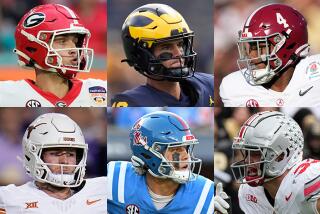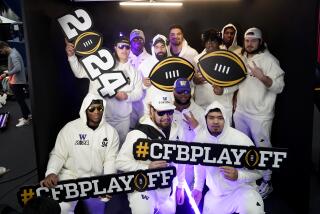Pac-10 Taking Beating at Polls
- Share via
With a month left in this alleged season of seasons, the top dog in the top conference has all but lost his bark. One glance at this week’s bowl championship series standings and Pacific 10 Conference Commissioner Tom Hansen knew his league’s finest hour was just about up.
Barring a late Stanford stampede, it appears unlikely any of the Pac-10’s one-loss teams can make up the necessary ground to play for the national title in the Jan. 3 Rose Bowl. “Virtually impossible,” Hansen said.
Hansen acknowledged that, in the era of the BCS, a conference is better off having one great team instead of five really good ones. “That’s just so obviously so,” he said.
And while it would be easy to rail against an abstract mathematical formula for all of this, the BCS is not to blame for the Pac-10’s fate. The computer geeks, in fact, are infatuated with the conference.
Stanford’s top-drawer computer average might look good on the back of a bookstore T-shirt: We’re No. 3.33! Of the five Pac-10 schools in this week’s BCS standings, only Washington has a higher poll average than its computer average.
Truth is, while much has changed in college football, nothing really has. The BCS formula was created to dilute the subjective bias of polls, yet it’s clear the polls still carry incredible power in determining who plays for the national title.
“The polls are the problem, the matter of perception,” Hansen said. “Everything else works fine.”
Take the case of Stanford, No. 6 in this week’s BCS but only No. 13 in the coaches’ poll and No. 10 in the AP.
If Stanford’s 11.5 poll average only matched its No. 6 BCS ranking, the Cardinal would be No. 3 in the BCS and percentage points behind Oklahoma for the coveted No. 2 spot. Stanford’s problem is the voting coaches and writers had no clue the team was this good, so the Cardinal began the year unranked. Washington State, picked to finish last in the Pac-10, suffered a similar fate.
Making the mountainous climb from unranked to national title contention is next to impossible, even if you might be the best team. So, as always, it’s about perception.
Oklahoma loses to Nebraska and drops from No. 1 to No. 2 in the BCS rankings. UCLA loses to Stanford and drops from No. 3 to No. 9. Stanford defeats two top-five schools , UCLA and Oregon, yet ranks five spots behind Brigham Young in the coaches’ poll?
The Pac-10, which could not be having a better year, still can’t shake its left-coast reputation. Voters tend to arrive late to the Pac-10’s cause. Washington and Oregon State finished No. 3 and No. 4 in the final AP poll last year, but were never in serious national contention because affirmation came after the fact; after Washington beat Purdue in the Rose Bowl and after Oregon State walloped Notre Dame in the Fiesta.
This week, the writers moved Stanford from 20th to 10th, the coaches moved it from 23rd to 13th, but it may not be enough. Florida defeated Georgia last weekend and jumped from No. 6 to No. 3 in the coaches’ poll. Voters obviously did not weigh the fact Auburn, which handed Florida its only defeat, got clobbered Saturday by Arkansas, 42-17.
Two weeks into the BCS, this much is clear: the computers have outclassed the voting coaches and writers. How else could you explain Oregon and UCLA still being ranked ahead of Stanford in the polls?
“I think we all know that some people who vote don’t give it the attention they should, and it’s so important that it demands everyone’s attention,” Hansen said. “That’s the biggest weakness. I think the computers tend to be more reflective of true values of teams.”
Even after all this tweaking, college football’s problem remains as age-old as Roy Kramer.
In the subjective polls, one-loss Florida is almost always going to outpoint any one-loss team from the Pac-10.
“The media gets such a fixation on something, and the fixation has been on the teams in Florida,” Hansen said. “But they’ve been pretty good too.”
Last year, Washington beat Miami but trailed the Hurricanes all year in the standings.
This year, Washington beat Michigan. Both schools have one loss. Yet, Michigan is ranked ahead of Washington in both polls.
“Sure it bothers me,” Hansen said of Michigan being ranked higher. “Washington won, fair and square. Very much like last year with Miami. Miami kept woofing about how it beat Florida State but it never mentioned Washington beat it, and fairly decisively.
“We all have selective memories.”
This may be as good as it gets, though, given that there is no immediate prospect of a playoff and no chance the voting coaches or writers will be removed from the selection process.
“I don’t think there’s much else you can do,” Hansen says of the BCS formula. “It is what it is. It’s doing what we wanted to do, so somehow we just have to ask people to be fair, which is asking a lot of human beings.”
Lonesome Cougars
To paraphrase Yogi Berra, it’s BYU all over again.
In 1996, Brigham Young waged a war with college football that ended up in Congress. The Cougars were 13-1 that year but not guaranteed a major bowl because the Western Athletic Conference was not one of six major conferences that control the sport. The WAC went to Washington and won a concession that stipulated any school that finished in the top six would be granted access to a major bowl in what in 1998 became the BCS.
BYU has moved on to the Mountain West, but its plight is the same. WAC Commissioner Karl Benson fought the fight then; Mountain West Commissioner Craig Thompson fights it now. BYU is one of three unbeaten Division I schools, averages a nation-leading 50 points a game, yet ranks No. 13 in this week’s BCS, a Cumberland gap-like 18.16 points removed from the No. 6 spot that would guarantee BYU a spot in either the Fiesta, Orange or Sugar Bowls.
“They’re still light years away from really, truly being in contention for an at-large berth,” Thompson said. Even if BYU ends up as the nation’s only undefeated team, Thompson says it’s doubtful the Cougars could move up to the No. 6 spot or be considered for one of two at-large spots.
This year’s Fiesta Bowl will match the champions of the Pac-10 and Big 12 conferences unless the Big 12 loses a team to the national championship game, which seems likely. Thompson says BYU, with a strong Mormon fan base in Phoenix, would be a good at-large fit for the Fiesta Bowl, but his feet are also rooted in reality.
“It’s a political world, it’s a challenging situation,” Thompson said, “and I could just see all sorts of pressures coming to bear that would be forced upon various people to not have a team like BYU play in a BCS bowl.”
Political pressure?
In college football?
BYU, which hosts Colorado State tonight, could be 13-0 at season’s end because the Cougars played two extra games this year. Should the Cougars finish 14-0 after a victory in the Liberty Bowl, Thompson says he might fight the BCS for more bowl access.
“Maybe public pressure and public opinion could help sway the BCS mind-set,” Thompson said. Thompson might propose any team that finishes 11-0 and in the top eight should be guaranteed a BCS bowl berth.
“Now, will that ever see the light of day?” Thompson asked. “Probably not.”
BYU’s national case is severely weakened by its abysmal 110th strength-of-schedule ranking, but Thompson says it is not the Cougars’ fault that California, a Pac-10 team, is so bad this year.
BYU was supposed to play at Mississippi State on Sept. 15, but events of Sept. 11 forced that game to be moved to Dec. 1. Now, with Mississippi State in free-fall at 1-5, not even a game against a traditionally strong SEC foe will greatly benefit BYU’s strength-of-schedule cause.
“Is BYU 8-0 because of its opponents or is BYU 8-0 because it’s a pretty good football team?” Thompson asked. “I think it’s a combination of both.”
Hurry-Up Offense
More bad news from South Bend: Notre Dame’s grip on the title of “winningest college football team” is becoming more precarious by the week. Notre Dame’s loss to Boston College last week dropped the Irish’s all-time record to 778-246-42, a winning percentage of .7495. Charging fast is Michigan at 811-263-36, a winning percentage of .7468. Should Notre Dame (3-4) lose its last four games--OK, OK, we know Navy’s on the schedule--and Michigan (6-1) win out, the Wolverines would pass the Irish by season’s end and finish .74798 to Notre Dame’s .74672.
Inside the BCS numbers: Which one-loss team has the best chance of earning a trip to the Jan. 3 Rose Bowl? Florida. The Gators are only No. 8 in this week’s BCS standings, but their 3.5 poll average puts them in great position for a championship run. Florida’s closing stretch of games: South Carolina, Tennessee, Florida State, plus the Southeastern Conference championship game, will provide a rocket boost in the other BCS components, computer average (currently at 10.58) and strength of schedule (34).
Nebraska fans can be insufferable and pompous--you should read the e-mails, folks--but there’s no denying they are among the nation’s most football knowledgeable and respectful entourage. Case in point: After Saturday’s 20-10 victory over Oklahoma, no fans stormed the field or remotely threatened the goal posts. Speaking on behalf of the team afterward, Nebraska’s secondary coach, George Darlington, issued a public apology for the select few Cornhusker fans who booed Oklahoma players when they ran onto the field.
More to Read
Go beyond the scoreboard
Get the latest on L.A.'s teams in the daily Sports Report newsletter.
You may occasionally receive promotional content from the Los Angeles Times.











